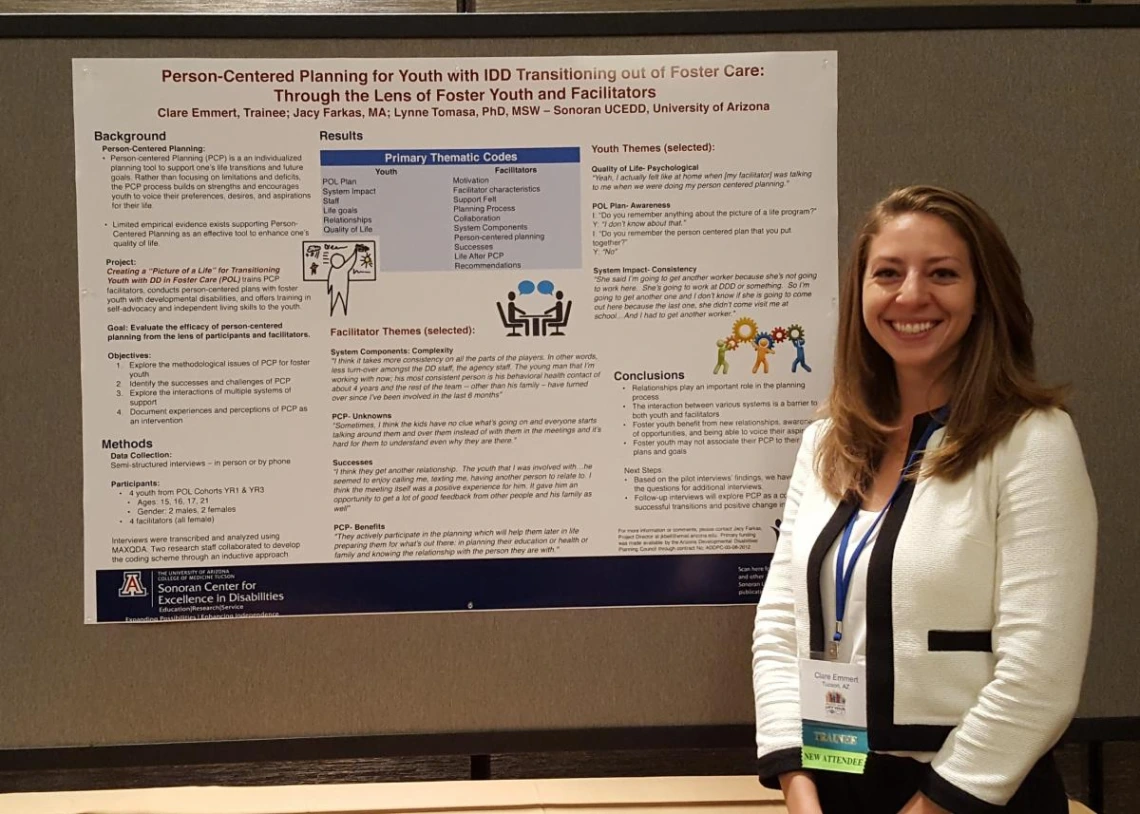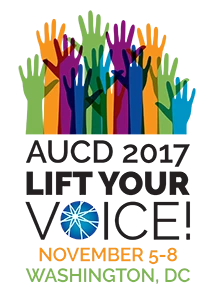The CACTI Blog: Advocacy & Accessibility: A Trainee's Reflections of the 2017 AUCD Conference

By Clare Emmert, 2017-2018 Undergraduate Certificate in Developmental Disabilities
I had the opportunity to attend the 2017 Association for University Centers on Disabilities (AUCD) Conference(link is external) in Washington, D.C. from November 5-8. Attending the AUCD conference was an incredible experience that gave me a new sense of confidence and left me even more committed to serving individuals with disabilities. Leading up to the conference, it was difficult to focus on anything other than preparing for my first poster presentation. I knew that I would be entering a space filled with leaders in the disability field, each equipped with years of professional and research experience that I was just beginning to build. However, as soon as I began sharing my own work on Person-centered Planning for foster youth with IDD, my feelings of nervousness were replaced with excitement. One after another, conference attendees took the time to stop and listen to the information I was sharing, genuinely engaged and interested in my work with the Sonoran UCEDD. Perhaps the most rewarding aspect of the AUCD conference was this opportunity to connect with others face to face, exchanging stories and building rich conversation around the importance of Person-centered Planning and other tools that could improve the lived disability experience. Throughout the remainder of the weekend, I found myself continually inspired by other attendees, eager to continue these conversations around their work, values, and ideas for change. I still think back to the community that was cultivated by the AUCD 2017 conference, and am so grateful to have been a small part of that. As I reflect on my conference experience, one session helped to re-shape my beliefs around self-advocacy and the important role information accessibility plays in advocacy, independence and inclusion of people with intellectual disabilities.
The concurrent session, “Accessibility is Much More than a Checkbox: Making Sure People with Intellectual Disabilities Can Truly Access Resources and Programs Independently,” addressed the importance of people with intellectual disabilities (ID) being able to access material on their own by highlighting AUCD’s “Tuesdays with Liz: Disability Policy for All(link is external),” the Autistic Self Advocacy Network (ASAN)’s Medicaid toolkit(link is external), and the Human Development Institute(link is external) (HDI)’s KentuckyWorks website(link is external). The session, led by long-time disability advocate, Liz Weintraub, and ASAN and HDI staff, demonstrated that accessibility also includes respectfully presenting information using multiple tools, learning devices, audience reviews, and clean formats. In sharing these resources and teaching others how to ensure information is accessible, the panel promoted inclusion of people with ID in multiple contexts.
Although the presentation content focused on designing accessible materials like websites and brochures, the speakers assured attendees that the strategies could apply to anyone who interacts with an individual with ID. For example, if one is sending an email or facilitating a meeting with a person with ID, the guidelines for ensuring the content is presented in an accessible format are equally applicable and important. For individuals with ID, it can be incredibly difficult to sift through lengthy documents ripe with academic language and absent of visuals or other supports. The session leaders reminded the audience that one should never simply omit information in order to make the process of creating an accessible format more feasible. While the accessible format can be lengthy and time-consuming to create, they encouraged attendees to think about information accessibility early on, incorporating funding for the process into their grants. All people should have equal access to information; it is crucial that individuals with ID have access to the same information that individuals without disabilities do, especially when it pertains to policies that affect their quality of life.
Unfortunately, it is not common in our culture to see individuals with intellectual disabilities in leadership positions, and often the policies that affect individuals with intellectual disabilities are discussed without involving the input of a self-advocate. Perhaps if our social and cultural constructs around intellectual disability were less stigmatized and more rooted in the value of this diverse population, organizations and leaders would already ensure that the materials they produce are universally designed.

Prior to this session, I viewed self-advocacy as something an individual is responsible for pursuing themselves. That is, if someone does not pursue the role of self-advocate, it must be because they simply don’t want to be. However, I now realize that this frame of mind is incomplete. While self-advocacy is a personal choice that cannot be forced upon someone, I had never considered that not everyone has equal access to becoming a self-advocate. I appreciated the way this session shed light on the environmental barriers that prevent individuals with intellectual disabilities from becoming self-advocates, and feel that our communities can take on more responsibilities to ensure the information they disseminate is accessible to diverse populations. Individuals and organizations who prioritize information accessibility show that they value the input of individuals with intellectual disabilities, ultimately increasing opportunities for individuals with disabilities to lift their voices.
The CACTI Blog features the voices of our interdisciplinary trainees and Community Advisory Council members as they highlight diverse images of people with disabilities and provide community information and advocacy on disability issues. Check Out The CACTI Blog
